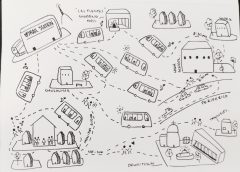Past Event! Note: this event has already taken place.
Women’s everyday lives and mass-produced social housing: the case of Hacienda Santa Fé in Guadalajara’s Metropolitan Area, Mexico
December 5, 2019 at 3:30 PM to 5:30 PM
| Location: | 2017 Dunton Tower |
| Cost: | Free |
| Audience: | Anyone |
Over the past 20 years, mass-produced housing complexes have led the expansion of urban peripheries in Mexico. This kind of housing production is characterized by the state assuming the primary role as an economic facilitator for housing production and acquisition, while private developers are left in charge of executing the physical construction of housing, which is a clear expression of neoliberal urbanism. This approach to social housing is primarily focused on the quantitative production of private houses, neglecting other factors necessary for the development of adequate urban habitat.

In this presentation, Paulina will examine the gendered dimensions of neoliberal urbanism and social reproduction by exploring women’s “emblematic spaces” of their everyday lives in mass-produced social housing complexes in Mexico. By “emblematic spaces” she refers to the places where women live, shop, work, relax, and relate to others. Unlike the urban development tendency that separates space by its function (e.g. housing, commerce, work, and so forth), the exploration of emblematic spaces demonstrates that daily life brings together a myriad of separate functions. They reveal the relational nature of activities that women have to manage on a daily basis. Through the study of emblematic spaces, this presentation will offer insights on the particular implications that living in a mass-produced housing complex has on women’s experiences of everyday life.
About the Presenter
 Paulina Ascencio graduated with a Master’s degree in Geography and Environmental Studies from Carleton University this fall. Her M.A. research project was awarded a Philanthropic Educational Organization (PEO) International Peace Scholarship. Her work and interests focus on urban geography, neoliberal urbanism, social reproduction, and the everyday lives of urban dwellers.
Paulina Ascencio graduated with a Master’s degree in Geography and Environmental Studies from Carleton University this fall. Her M.A. research project was awarded a Philanthropic Educational Organization (PEO) International Peace Scholarship. Her work and interests focus on urban geography, neoliberal urbanism, social reproduction, and the everyday lives of urban dwellers.